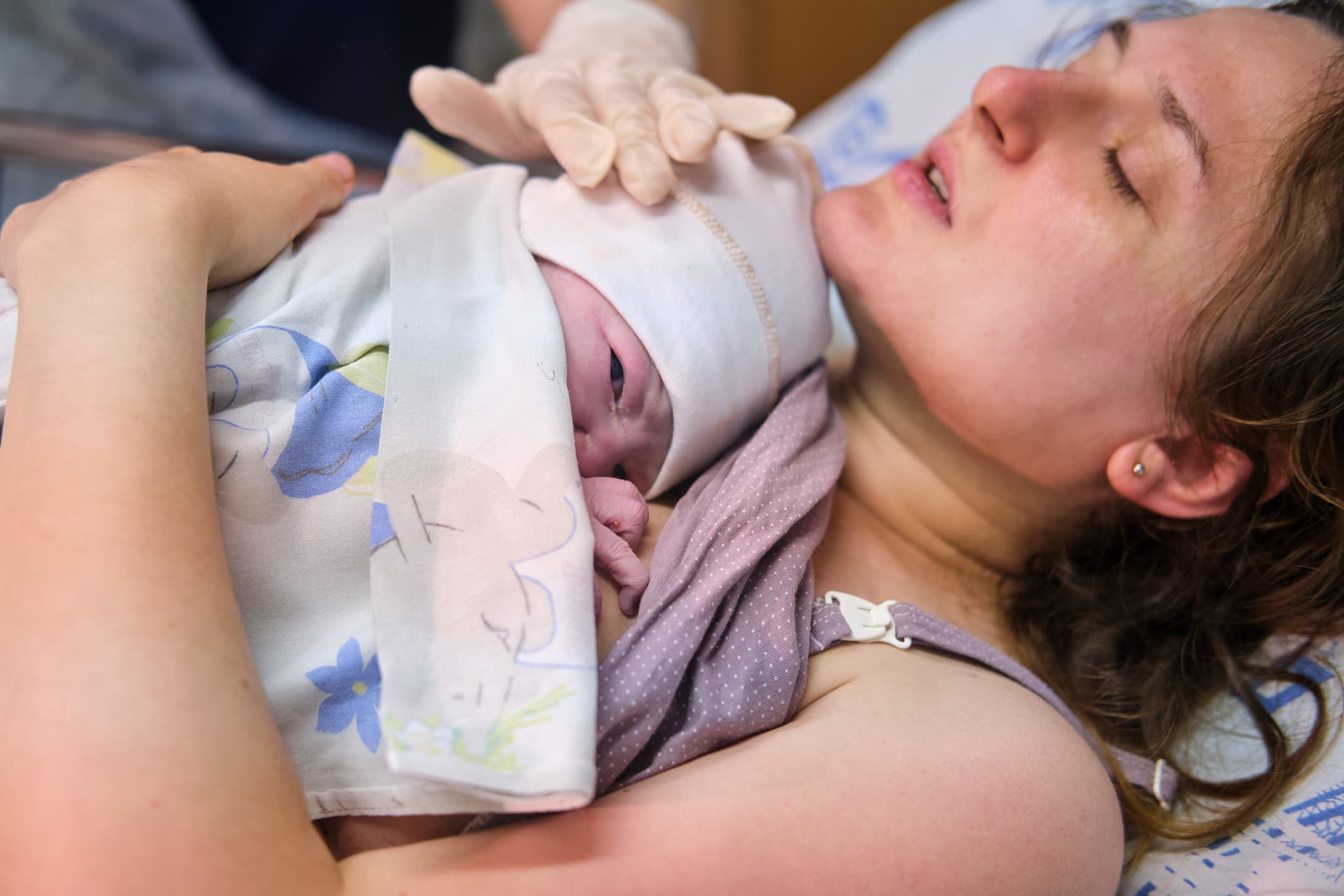There is a lot of excitement, anxiety, anticipation, and preparation surrounding your pregnancy journey. You read parenting books, attend childbirth classes, and doctor appointments, and create a birth plan. It helps get you in the right headspace for this incredible life moment. But while nearly everyone is more than happy to share the intimate details of their birth experiences, what are some things women often say after childbirth?
Whatever your birth experience, it will be uniquely yours. Natural labor, inductions, vaginal births, C-sections; each circumstance comes with its messy challenges and beautiful moments. Regardless of how you bring your baby into the world, the goal is the same: getting to hold your beautiful, healthy, perfect little love in your arms. You’re bound to have a million questions after your baby arrives. Still, the important thing to remember is that while you can’t always have all the answers, you will figure parenting out and gain confidence. Below are 20 of the most common things new mommas say after childbirth:
20 Things Women Commonly Say After Childbirth
“Is My Baby Okay?”
You’ve heard your baby’s first cry bursting into the room. Has there ever been a more beautiful noise? And sometimes, it can take a minute or two for them to clear out their lungs and let out a cry. As a new mom, it’s natural for you to want the immediate health status of your child and this is definitely a common thing for women to say after childbirth. After all, you’re seeing them for the first time after protecting them in your belly for nine whole months! Typically, health assessments start right away in the delivery room. One of the first checks is the Apgar test, a scoring system for evaluating a baby’s condition at 1 minute and 5 minutes after birth.1 A brief physical exam is done to check that the baby is healthy, and various tests are performed in the coming hours and days leading up to your discharge.1
“Can I Hold My Baby?”
Your instinct to be physically reunited with your baby is intense once they enter the world. However, holding your baby after birth depends on the delivery circumstances. As a C-section momma, my arms were restrained, and the doctors needed to complete my surgery. So, while my husband held our baby close and I could see him, I couldn’t wrap him in my arms immediately after his birth, which stung. Other situations may mean mom or baby needs extra medical attention post-birth, which may delay your ability to hold your baby right away.
“How Much Does the Baby Weigh?”
Remember, like adults, every baby is unique. You have a team of medical experts to help make sure your baby thrives once they’ve entered the world. According to the Centers for Disease Control growth charts, the average birth weight of a full-term baby boy is 7 pounds, 6 ounces. The average birth weight of a full-term baby girl is 7 pounds, 2 ounces. At delivery, experts consider a low birth weight to be less than 5 pounds, 8 ounces.2 Try not to obsess over these numbers because your baby’s weight will fluctuate significantly in the days and weeks after they leave the hospital.
“Thank Goodness It’s Over!”
This is a pretty universal thing women say after childbirth. Granted, some moms experience blissful births – and maybe you will, too. But many of us are happy to have finally gotten through the delivery phase and are anxious to file it away under really hard experiences we’re proud of but not eager to revisit anytime soon.
Vaginal Birth Moms: “Did I Tear?”
Up to 9 in every 10 first-time mothers who have a vaginal birth will experience some tearing.3 While it’s slightly less common for mothers who have had a vaginal birth before, it is typical for the perineum (the area between your vaginal opening and anus) to tear to some extent during childbirth. Tears can also occur inside the vagina or other parts of the vulva, including the labia. The good news? For most women, these tears are minor and heal quickly.3
C-section Birth Moms: “How Long Do I Keep This Medical Bandage On?”
The medical staff will change your bandage while you’re still in the hospital. They will also let you know if you need to keep one on once you are discharged. If you go home with a bandage, change the dressing over your incision once a day, or sooner if it gets dirty or wet. Your provider will tell you when to stop keeping your wound covered. According to the National Library of Medicine, keep the wound area clean by washing it with mild soap and water but be gentle; you don’t need to scrub it.4 Letting the water run over your wound in the shower is often enough. You’ll also want to avoid soaking in a bathtub or hot tub or going swimming until your provider tells you it’s okay. Usually, this is not until about three weeks after surgery.4
“When Will I Feel My Legs Again?”
Ok, so you’re not exactly trying to run a marathon after labor, but maybe you’re itching to move around. If you received an epidural for your delivery, the effects usually wear off within two hours after the medicine is stopped.5 If you deliver naturally and without drugs, you may feel weak or unstable from the physical demands of labor. Regardless, if the feeling comes back two hours after birth or more, be sure to let your nursing staff know you’d like to stand up and walk around before springing out of your hospital bed. And it’s always wise to have someone on standby to lend a helping hand if you don’t feel 100% yourself.
“I’m So Tired.”
Declaring their tiredness is a common thing women say after childbirth. Yes, you will probably be exhausted after birth, even though there is an initial adrenaline boost when your baby enters the world. I was given a few different medications for my C-section delivery that made me extremely drowsy, and I had also been in labor for over 24 hours. Hence, my body was pretty much ready for a long nap. Luckily, a team of medical professionals can assist you and your partner with care until you are discharged. That means you can get some much-deserved shut-eye. Even if you want to soak in every second of breathing in the details of your new favorite tiny human, it’s a good idea to take advantage of your extra help and recharge before you head home.
“Why Do I Feel So Nauseous?”
Labor is hard work, and hard work can make us feel physically exhausted and ill. There are so many factors at play regarding delivery and nausea. Feeling queasy is typical, from dehydration to nerves to medication your team may have administered during labor and delivery. Of course, if nausea persists for several days once you’ve returned home, it’s essential to listen to your body and contact your doctor. While doctor visits were once scheduled at six weeks postpartum, the American College of Obstetricians and Gynecologists (ACOG) now recommends that patients have contact with their doctors within the first three weeks and have a comprehensive exam by 12 weeks.6
“When Can I Eat?”
Every hospital has a different policy on eating and drinking during labor. Some moms are exhausted post-birth, and others are starving. You may go many hours without eating solid foods, depending on your birth journey. Just like you are required to fast before having major surgery, doctors began requiring women to fast during labor after it was documented in the mid-20th century that pregnant women who were put under general anesthesia had an increased risk for aspiration.7 Check with your medical team to learn whether a particular food is okay during your delivery. But know that after delivery, there are typically no restrictions on how soon you can enjoy a meal.
“What Can I Eat?”
Everything! Just kidding, but you’ll be happy to return to the land of no dietary restrictions after birth. Depending on how long you’ve been surviving on broth, gelatin, and ice chips, you’re probably starving. It’s always a nice treat to have family outside the hospital on standby to deliver a meal you’ve been craving for the past nine months (hello, beautiful sushi rolls and deli meats). But remember that you may feel nauseous and want to try bland, simple staples that won’t disrupt your digestive system. Think eggs, oatmeal, or fruit to start. It’s also best for new moms to eat plenty of fiber and drink lots of water to avoid constipation, which is common postpartum.
“Can You Not Massage My Stomach?”
Ah, the dreaded postpartum tummy massage. While this can vary in intensity for each mom, it tends to be uncomfortable. However, it is necessary for your overall health and care. The main reason to perform uterine massages (known as fundal massages8) is to help encourage the uterus to continue to contract and prevent postpartum hemorrhage.8,9 After the placenta detaches and is delivered, the area where it was attached to the uterine wall bleeds. Uterine contractions naturally help push out this blood and put pressure on the blood vessels in the uterus to stop the bleeding.
For this reason, your care team will perform fundal massages whether you have a vaginal or C-section delivery. Don’t stress this step –after all, you’re a superwoman who just brought life into this world! A little temporary discomfort? You’ve got this.
“When Can I Start Breastfeeding?”
A team of lactation consultants will be able to assist you and give you a ton of helpful knowledge and instruction after you give birth and have had a little time to rest. If you choose to breastfeed, it can start in the hours right after your baby is born. Doctors often promote skin-to-skin contact after birth to encourage your baby to bond and breastfeed. A consultant can help you place your baby to your breast in a comfortable position for both of you when you’re ready.
Your baby’s mouth should cover most of your areola (the darker area that encircles your nipple) when they latch correctly. Typically, you’ll feel your baby pull on your nipple as they feed. Don’t get frustrated if it takes you several hours, days, or months to get the hang of it. There’s a learning curve for this process, and this is new for both of you.
“How Do I Know If My Baby Is Getting Enough Milk?”
Among the things women say after childbirth, this one can be hard to navigate. Postpartum anxiety is real, and many worries and concerns come with caring for a newborn. My baby boy initially had trouble latching. I opted to pump exclusively for several weeks because I felt more at ease knowing I could physically measure the amount of milk he was ingesting during each feeding. I was able to transition to breastfeeding later, but every mom has a different experience and preference. Supplementing or exclusive formula feeding are options to measure milk intake. If you’re concerned, it’s always best to contact a lactation consultant and troubleshoot together. If you’re opting to breastfeed exclusively, there are a few signs that your baby is sufficiently fed10:
- Your baby’s cheeks are full while feeding rather than sucked in
- Your baby releases on their own from your breast or falls asleep and releases
- Your baby seems happy and content after feeding
- You may feel sleepy after feedings
- You can see or hear your baby swallowing during feeding
- Your breasts feel soft, not hard, after feeding
Another indicator? Wet diapers mean a hydrated baby. Things may start slowly with only two wet diapers on day two and three wet diapers on day three. But by the time day five rolls around, you should typically see six or more wet diapers in a 24-hour period.11
Boy Moms: “If I Have My Baby Circumcised, Will It Hurt Him?”
Once your baby has made his debut, momma bear mode activates. While it can be hard to watch your baby get wheeled out of your room for his circumcision (if you opt to have one performed), rest assured that this is a common procedure.12 Typically, a local anesthetic is given to numb the area and prevent pain because the surgery is done while the baby is awake. While it’s a personal decision, if you decide to have your son circumcised, he likely won’t remember the procedure and will be back in your arms before you know it.
“These After-Pains Suck.”
Some women experience sharp after-birth pains, while others do not. As a first-time mom, I did not because after-pains are more common for women who have given birth before. It may feel like period cramps or even labor contractions.13 If you experience this pain, it’s completely normal, and it’s a sign that your uterus is contracting and relaxing as it shrinks back to its standard size14 (I know, how amazing are our bodies?). Medical experts recommend applying a heating pad to your abdomen to relieve discomfort. Ask your doctor about over-the-counter pain relievers.14
“My Belly Feels So Weird.”
Yeah, you just had a baby in your body for the past nine months, and you just went through the trauma of delivery. It’s going to feel weird for a little while. When you’re pregnant, hormonal changes allow the connective tissue to thin and stretch so your belly can expand. As a result, your growing uterus causes your abdominal muscles to separate and move aside.15
Some women experience diastasis recti when their abdominal muscles are so stretched that they don’t fully come back together after pregnancy. However, this will take several weeks to determine, and you can address it later with your doctor.15 Physical changes aside, you need time to heal and to adjust to the fact that your baby is now earth-side with you. My grandma once told me it took her several days to emotionally connect with her firstborn because she missed the baby inside her body and needed time to process the whole event.
“When Will I Be Able to Get Out of Bed?”
Between feeling exhausted after labor and managing the pain from the surgery, getting out of bed may be the last thing on your mind. But medical experts agree that getting out of bed at least once or twice a day at first can help speed your recovery.16 It also decreases your chance of having blood clots and helps your bowels move. How soon you can get up and about will depend on your delivery and any medication you are being administered for pain relief. Having your partner or a nurse is essential in case you get dizzy or weak.16
“When Can I Take a Shower?”
Ah, that first post-delivery shower. Science may not be able to prove this is the best shower of your life, but boy, does it rank high up there. Unless your doctor advises otherwise, you can shower as soon as you feel up to it after delivery. There is something truly rejuvenating and healing about that first post-birth shower experience. You will likely feel refreshed after a shower, but it’s essential to listen to your body and get assistance from your partner or a nurse if you feel dizzy or weak when you first shuffle your way into the bathroom. I almost fainted when I made my first post-birth shower attempt and got some very stern talks from the doctor (and my husband) for trying to be too independent too soon after delivery.
“When Do We Get to Go Home?”
This is probably the most common thing women say after childbirth when they give birth at a hospital or birthing center. When you, your partner, and your new baby get to head home largely depends on whether there were any complications with your delivery. Following a standard vaginal delivery, most women remain in the hospital for 24 hours; for a C-section, a two- to three-day hospital stay is average.16 Try to think of this as a time to bond with your baby and take advantage of all the medical experts who can answer questions at your bedside with a button click. Even though you’re likely super anxious to get out of that hospital room and into your cozy nest, you’ll miss them when you’re home!
Pregnancy, birth, and postpartum come with many unknowns and questions and other things women say after childbirth. Know that your feelings are valid and that no question is off-limits. The team of medical professionals is there to assist you. My initial post-delivery experience was a combination of awe and pride in what I had just accomplished, mixed with much doubt. Did I have a low milk supply? Was I getting my baby to latch correctly? Was I eating the optimal foods to help my baby thrive? Remember you are built for this, momma, and can always ask questions or for help.

 PARENTING TIPS
PARENTING TIPS PREGNANCY
PREGNANCY BABY CARE
BABY CARE TODDLERS
TODDLERS TEENS
TEENS HEALTH CARE
HEALTH CARE ACTIVITIES & CRAFTS
ACTIVITIES & CRAFTS


